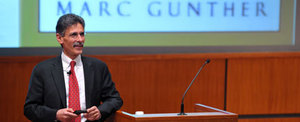Journalist says religious groups could fight global warming as they did slavery
Published: April 8, 2011 / Author: Ed Cohen

A movement to solve what business writer Marc Gunther calls the “most difficult problem the world has ever had to solve” is not likely to come from government or business, Gunther said today at the University of Notre Dame.
It will require institutions that think on a longer time scale.
Eternity.
The issue to which Gunther referred is global climate change. In his talk for the Mendoza College of Business 2011 Ten Years Hence Speaker Series, he said religious institutions could drive a movement to address the environmental threat the same way religiously inspired abolitionists led the movement to outlaw slavery.
“The global economy was as dependent on slavery in the 18th and first half of the 19th centuries as we are today dependent on fossil fuels,” said Gunther, a contributing editor at Fortune magazine who has written about issues of sustainability and spirituality in business.
In the case of abolition, he said, a small group of people – mostly motivated by religious beliefs – appealed to the broader society’s sense of right and wrong. And in about 50 years they “pretty much wiped slavery … from the face of the earth.”
“That’s about the amount of time we have now,” he said, referring to scientists’ forecasts of catastrophic environmental damage from the buildup of carbon dioxide in the atmosphere.
In a talk titled “Keeping the Faith in Capitalism,” Gunther cited many examples of how companies that were pressured to operate more responsibly or sustainably have ended up profiting from the changes they made.
Thanks to a sophisticated recycling program, waste disposal at Walmart went from being a substantial expense to a revenue stream, he said.
McDonald’s, blamed by some for the country’s obesity epidemic, added healthier choices and became more transparent about its ingredients. The changes attracted more women customers, especially young mothers, and built a bond of trust, Gunther said.
“What began as threats turned out to be opportunities,” he said.
But for all those gains, no meaningful progress has been made on climate change, he said. Greenhouse gas emissions have grown every year since 1990, except in 2009, when a deep global recession existed, he said.
Gunther said it’s difficult to get people excited about the greenhouse-gas issue because carbon dioxide is odorless and colorless, unlike the smoky or smoggy air pollution that led to higher air-quality standards in the 1960s. Also, people would have to pay now and out of their own pockets – in the form of higher taxes on gasoline or to install solar panels on their homes home, for instance – for benefits that would be global in nature and far in the future.
“That’s a very tough problem, both in terms of personal action to take … and for the political system to solve,” he said.
Neither government nor business is well equipped to educate or motivate people to act on global warming, he said, because they tend to focus on pleasing shareholders at the next earnings report or voters at the next election.
Religious groups, on the other hand, take a longer view.
He cited a 2001 statement of the U.S. Conference of Catholic Bishops that called for “a civil dialogue and prudent and constructive action to protect God’s precious gift of the earth’s atmosphere with a sense of genuine solidarity and justice for all God’s children.”
Gunther, who is Jewish said, said he could have found a similar quote from evangelical Christian, Jewish and other religious groups.
“The challenge, really, is to get those words heard more widely in the world.”
In addition to his work for Fortune, Gunther is a senior writer at Greenbiz.com and a blogger at www.marcgunther.com. He is the author of four books, including Faith and Fortune: How Compassionate Capitalism is Transforming American Business (2004).
Gunther’s talk was the final installment of spring semester in the Ten Years Hence Speaker Series, which explores issues, ideas and trends likely to affect business and society over the next decade. The series is sponsored by the O’Brien-Smith Leadership Program, made possible by a generous endowment from William H. O’Brien (ND ’40) and his wife, Dee.
The O’Brien-Smith Program endowment provides an opportunity for students and faculty to interact with distinguished leaders from business, government and nonprofit sectors.
/news_and_events/news_articles/article/8881/journalist-says-religious-groups-could-fight-global-warming-as-they-did-slavery




